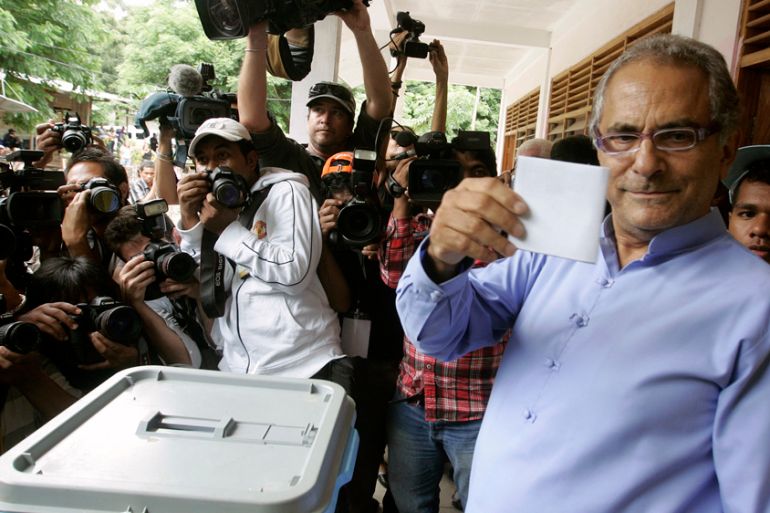Jose Ramos-Horta: East Timor will survive as oil ends
Former PM and president says astute resource management will benefit tiny Southeast Asian nation.

East Timor, one of the world’s poorest countries, could still be an economic success story despite reports its main oil and gas fields will run dry by 2022 and it will go bankrupt by 2027, according to its former leader.
Devastated by years of foreign occupation, Southeast Asia’s youngest nation has relied heavily on its dwindling energy sector, which accounted for 78 percent of its 2017 state budget.
Keep reading
list of 4 itemsA flash flood and a quiet sale highlight India’s Sikkim’s hydro problems
Why is Germany maintaining economic ties with China?
Behind India’s Manipur conflict: A tale of drugs, armed groups and politics
Speaking on the sidelines of International Civil Society Week in the Fijian capital, Suva, Jose Ramos-Horta – who served as prime minister from 2006-2007 and president from 2007-2012 – insists his country, once seen as a poster child for developing nations, can overcome its economic hurdles.
“East Timor is only 15 years old. If you saw what my country was like at the start of this century, you’d be shocked,” Ramos-Horta told Al Jazeera.
Indonesia annexed East Timor, which sits at the eastern end of the Indonesian archipelago, in 1975 when long-time colonial power Portugal set it free.
Indonesian strongman Suharto‘s military swept across the country in a lightning offensive, laying waste to entire villages with US-made weapons and equipment.
More than 100,000 East Timorese were killed during the 24-year occupation in what academics from the University of Oxford and Yale University have called genocide.
When Indonesia finally left in 1999 following a UN supervised independence referendum, more than 80 percent of the country’s infrastructure had been destroyed.
The country became fully independent in 2002 after a three-year period of UN administration.
“In 2002, we had 19 East Timorese doctors in the country,” the 67-year-old said. “Today we have close to 1,000.”
“We barely had electricity anywhere in the country, including the capital, Dili. Today, we have continuous electricity in 80 percent of the country. The remaining 20 percent uses alternative methods such as solar.”
Ramos-Horta, who was co-awarded the Nobel Peace Prize in 1996 for lobbying foreign leaders for Indonesia’s withdrawal, said his government planned for the depleting oil and gas reserves, with the country’s economic future no longer reliant on its offshore deposits.
“Unlike many other oil and gas producing nations, we immediately created a sovereign wealth fund. We started with £250m and now we have more than $16bn in the bank.
|
|
“At the time, the law said 90 percent of oil and gas revenues will go to buying US treasury bonds. Ten percent, we could use to diversify. Since we didn’t have a lot of experience in the international market we decided to invest everything in US treasury bonds.
“When the 2008 financial crisis struck, better economies than ours, countries with a stronger international standing like Singapore and Norway, lost tens of billions. East Timor didn’t lose a cent.”
Speaking to the media in 2008, the US-educated politician quipped East Timor could become the “next Dubai”.
But tensions have simmered in the nascent democracy over income inequality and high unemployment.
According to the government’s latest figures from 2014, 41.8 percent of the population lived below the poverty line of $1.52 per day.
The current government, led by Prime Minister Mari Alkatiri, also faces increasing pressure to generate new jobs with 60 percent of its population aged under 25.
The country’s main oil and gas field, the ConocoPhillips-operated Bayu-Undan project, provided about $20bn to the petroleum fund over the past 10 years, but is expected to cease production by 2022.
“We changed our laws in 2009 to allow bigger changes to our economic portfolio. We now have more than 1,000 investments around the world,” Ramos-Horta said.
“We have hundreds of people studying for their masters in countries abroad. At the same time, we are investing wisely. We are living off these investments.
“When I said Dubai I was daydreaming. Forget Dubai. I would be happy if East Timor could reach the heights of Fiji.”
However, researchers at the Dili-based think-tank La’o Hamutuk said unless new sources of income are found, the country could go bankrupt as early as 2027.
La’o Hamutuk warned East Timor’s parliament last year the 2017 budget of $1.39bn would require a withdrawal of more than $1bn from the petroleum fund. With the government planning to take out almost four times the estimated income every year between 2018 and 2021, the fund’s balance will fall by at least $3bn, to $13bn.
The think-tank urged the government to reassess several mega-projects, questioning their “benefits for the majority of Timorese people”.
“These projects will displace local communities, use up valuable agricultural land, destroy farmers’ livelihoods and pollute the environment. Meanwhile, the money spent in them comes from a finite total, and is no longer available for necessary projects, sustainable economic development, equitable projects, and social services for everyone,” it said.
Aside from oil, agriculture is a key component of the economy, providing subsistence to about 80 percent of the population.
The most significant commodity export is coffee, which accounted for $30m of annual exports in 2016.
“We could do much better,” Ramos-Horta said when pressed about the future of East Timor’s fledgling economy. “But we can’t do miracles.”
Follow Al Jazeera’s Faisal Edroos on Twitter: @FaisalEdroos
|
|